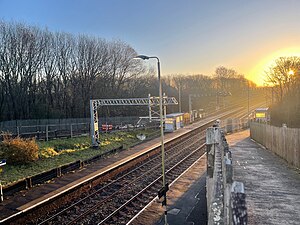Clifton railway station (Greater Manchester)
 The ramp leading to the northbound platform in 2023 | |||||
| General information | |||||
| Location | Clifton, Salford England | ||||
| Coordinates | 53°31′20″N 2°18′51″W / 53.5223°N 2.3141°W | ||||
| Grid reference | SD793028 | ||||
| Managed by | Northern | ||||
| Transit authority | Transport for Greater Manchester | ||||
| Platforms | 2 | ||||
| Other information | |||||
| Station code | CLI | ||||
| Classification | DfT category F2 | ||||
| History | |||||
| Original company | East Lancashire Railway | ||||
| Pre-grouping | Lancashire and Yorkshire Railway | ||||
| Post-grouping | London, Midland and Scottish Railway | ||||
| Key dates | |||||
| June 1847 | Opened as Clifton Junction | ||||
| 6 May 1974 | Renamed Clifton | ||||
| Passengers | |||||
| 2019/20 | |||||
| 2020/21 | |||||
| 2021/22 | |||||
| 2022/23 | |||||
| 2023/24 | |||||
| |||||
Clifton railway station is a railway station in Clifton, Greater Manchester, England which was formerly called Clifton Junction. It lies on the Manchester–Preston line.
History
[edit]The railway line between Salford and Bolton, the Manchester and Bolton Railway (M&BR), opened in 1838, but had no stations between Agecroft Bridge and Ringley.[1] In 1844, the Manchester, Bury and Rossendale Railway (MB&RR) was authorised to build a line from a junction with the M&BR at Clifton, to Rawtenstall. It opened to the public on 28 September 1846,[2] by which time the MB&RR had amalgamated with other companies to become the East Lancashire Railway,[3] and the M&BR had itself amalgamated with the Manchester and Leeds Railway;[4] the M&LR became the Lancashire and Yorkshire Railway in 1847.[5]

The Bury line ran northward from the junction, crossing the Irwell Valley on the Clifton Viaduct (known locally as the "13 arches"), to run on the opposite side of the valley from the Bolton line. A station at the junction, with two platforms for each route (Bolton or Bury), opened in June 1847, and was named Clifton Junction.[2][6]

The line to Bury closed in 1966 along with the platforms that served it, with the tracks being lifted in 1968.[7] The old Bury and Accrington platforms are still intact (though heavily overgrown) in the woodland that now occupies the site of the junction behind the modern station, and the viaduct remains a Grade II listed local landmark.
On 6 May 1974 the station was renamed Clifton,[6][8] (even though the area has become known as Clifton Junction), and in the 1990s the service was reduced to one train per day in each direction.
The closest station to Clifton Junction with a regular service is Swinton 1.25 miles (2.01 km) away on the line between Manchester and Wigan Wallgate via Atherton.
Local industry made good use of Clifton Junction railway station long before the advent of mass car ownership when three factories were established close by enabling employees and visitors access by train. The three factories were Magnesium Elektron Ltd, Chloride Batteries Ltd and Pilkington's Tiles Ltd.[citation needed]
Services
[edit]The service at Clifton railway station is very limited in the current 2024 timetable (and has been since 1992),[9] with just one train calling in each direction between Stalybridge and Southport per day - southbound (at 08:36) in the morning peak and northbound (at 18:20) in the evening. In 2012, the station had only a small amount of services day in each direction (local services run by Northern); only 170 passengers were recorded as using the station in 2010–11. The single daily service each way was suspended between May 2015 and the December 2015 timetable change due to the ongoing modernisation work at Farnworth Tunnel, with a replacement bus provided instead. The station reopened on schedule on 14 December 2015.
Electric service commenced on Monday 11 February 2019, initially utilising Class 319 electric multiple units.[10]
There is no Sunday service.
References
[edit]- ^ Marshall, John (1969). The Lancashire & Yorkshire Railway, volume 1. Newton Abbot: David & Charles. pp. 30–30. ISBN 0-7153-4352-1.
- ^ a b Marshall 1969, p. 110
- ^ Marshall 1969, p. 106
- ^ Marshall 1969, p. 33
- ^ Marshall 1969, p. 65
- ^ a b Butt, R.V.J. (1995). The Directory of Railway Stations. Yeovil: Patrick Stephens Ltd. p. 63. ISBN 1-85260-508-1. R508.
- ^ Disused Stations - Clifton JunctionDisused Stations; Retrieved 14 December 2015
- ^ Slater, J.N., ed. (July 1974). "Notes and News: Stations renamed by LMR". Railway Magazine. 120 (879). London: IPC Transport Press Ltd: 363. ISSN 0033-8923.
- ^ Disused Stations - Clifton JunctionDisused Stations; Retrieved 14 December 2015
- ^ McDonnell, Seamus (14 February 2019). "First electric trains are a 'new dawn' for Bolton commuters | The Bolton News". The Bolton News. Retrieved 11 May 2020.
External links
[edit]- Train times and station information for Clifton railway station (Greater Manchester) from National Rail
- History of the Liverpool and Manchester Railway with mention of Molyneux Junction
- Images of Clifton line, including a reference to Molyneux Brow Station
Railway Lines in Salford | ||||||||||||||||||||||||||||||||||||||||||||||||||||||||||||||||||||||||||||||||||||||||||||||||||||||||||||||||||||||||||||||||||||||||||||||||||||||||||||||||||||||||
|---|---|---|---|---|---|---|---|---|---|---|---|---|---|---|---|---|---|---|---|---|---|---|---|---|---|---|---|---|---|---|---|---|---|---|---|---|---|---|---|---|---|---|---|---|---|---|---|---|---|---|---|---|---|---|---|---|---|---|---|---|---|---|---|---|---|---|---|---|---|---|---|---|---|---|---|---|---|---|---|---|---|---|---|---|---|---|---|---|---|---|---|---|---|---|---|---|---|---|---|---|---|---|---|---|---|---|---|---|---|---|---|---|---|---|---|---|---|---|---|---|---|---|---|---|---|---|---|---|---|---|---|---|---|---|---|---|---|---|---|---|---|---|---|---|---|---|---|---|---|---|---|---|---|---|---|---|---|---|---|---|---|---|---|---|---|---|---|---|
Past, present and future
| ||||||||||||||||||||||||||||||||||||||||||||||||||||||||||||||||||||||||||||||||||||||||||||||||||||||||||||||||||||||||||||||||||||||||||||||||||||||||||||||||||||||||
| ||||||||||||||||||||||||||||||||||||||||||||||||||||||||||||||||||||||||||||||||||||||||||||||||||||||||||||||||||||||||||||||||||||||||||||||||||||||||||||||||||||||||
| Preceding station | Following station | |||
|---|---|---|---|---|
| Northern Trains Limited service | ||||
| Disused railways | ||||
| Dixon Fold Line open, station closed |
Lancashire and Yorkshire Railway Manchester and Bolton Railway |
Agecroft Bridge Line open, station closed | ||
| Molyneux Brow Line and station closed |
Lancashire and Yorkshire Railway East Lancashire Railway |
|||
